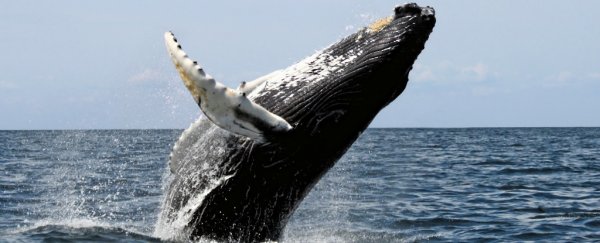Researchers are trying to figure out why humpback whales keep going out of their way to save different creatures from becoming orca meals.
In fact, some have witnessed humpbacks intervening in orca hunts to save other mammals so many times – 115 to be exact – that they now suggest the protective behaviour could be ingrained in the whales, though no one is completely sure why.
"Anecdotes have been passed down for centuries about dolphins at sea coming to the aid of distressed conspecifics [members of the same species], as well as other species, including humans," an international team of researchers, led by Robert Pitman from the US National Marine Fisheries Service, say in a new review of the humpback behaviour.
"However, more recent observations, including popular accounts and videos posted on the internet, suggest that a baleen whale – the humpback whale (Megaptera novaeangliae) – also approaches marine vertebrates in distress, most notably, when they are being attacked by killer whales (Orcinus orca)."
To understand how weird this is, we need to tell you one of the stories. According to Bryan Nelson from Mother Nature Network, one of the most ridiculous humpback rescues happened back in 2009, when a pod of orcas was hunting a seal trapped on a sheet of ice near Antarctica.
After the orcas managed to knock the seal off the ice, researchers were shocked to see a gigantic humpback whale rise up from under the seal, blocking the orcas.
While this seems like it could just be a fluke (see what we did there?) the humpback actually turned over, lifting its belly above water, and placed the seal on top of it, protecting it from the predators.
This example – while being just straight-up weird – is also evidence that humpbacks know exactly what they're doing when they rescue these creatures, says Pitman, who made the observation.
Now researchers are wondering where this behaviour stems from. After all, it's not like humpbacks really gain anything by being the good guys of the sea.
"More often, though, humpbacks approached MEKWs (mammal-eating killer whales) that were attacking prey species that were clearly not humpbacks (e.g. a grey whale calf with its mother, a seal hauled out on an ice floe, a sunfish), and although the humpbacks faced little risk of serious injury, they also gained no obvious benefits for their time and energy spent," the team writes in Marine Mammal Science.
While nothing is conclusive, one of the team's leading hypotheses is that humpback whales are used to seeing their calves hunted by orcas, which makes them approach orca groups hunting other creatures to protect them out of altruism, revenge, or a simple mix-up.
"As is evident above, most reports describing humpback interactions with MEKWs have emphasised humpback defensive behaviours, but there is a growing body of evidence to suggest that humpback anti-predator behaviour may have evolved beyond just basic defence, possibly including humpbacks deliberately interfering when MEKWs are attacking other humpbacks and even other species," the team explains.
Right now, the team has only reviewed the recorded interactions between humpbacks and orcas. To fully understand the complexities of these interactions, a lot more research is needed.
One of the coolest things researchers might learn from observing these interactions, though, is how complex a humpback whales' emotional processing is, because if they're somehow engaging in a type of 'war' with orcas, as has been speculated, it would tell us a lot.
Back in July, researchers from Italy also found evidence that whales dolphins mourn their dead, a behaviour that we typically reserve for humans, and doesn't offer any survival benefits.
Of course, the aggression towards killer whales might also stem from other things, too. The behaviour could be a response to the distress calls of other marine mammals. Either way, it's going to be very interesting to see what comes with further study.
The findings have been published in the journal Marine Mammal Science.
